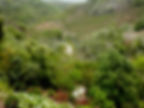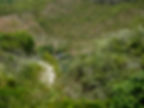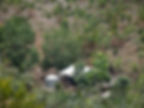
Slash & Burn
The Impact on Agriculture
The majority of local farmers practice what is called slash and burn agriculture and they don't compost, which is unfortunate given the poor soil conditions. This practice has especially devastating results when done on a hillside, as these photos illustrate. The erosion that takes place during the rainy season can last for decades, as the farmer of this plot discovered. We can have a huge impact if we can act quickly and help. Our horticultural consultant will work on basics with farmers and work to create fair trade peanut products. Our hope is providing better living wages in exchange for better agricultural practices and mutual agreements protecting public and private lands.
On our last visit to Belize in December 2013, our horticulture consultant gave presentations to two schools in San Antonio on the importance of composting and introduced the idea of Alley Cropping in hopes they would share the brochures with their families. We are hopeful that soon we will be able to start a demonstration plot of Alley Cropping with Inga trees and work with the Maya Green Growers Association getting Inga trees to local farmers to start Alley Cropping in their fields. We had many interviews with local farmers and learned that their biggest concern is the fungal diseases they are fighting.
In the November 2013 issue of the Belize Ag Report, there was a timely article on the effects of glyphosate- the main ingredient in Round Up. This insidious ingredient works against the natural chemistry of the soil biota and in effect, kills plants by 'waking up' the fungal diseases that are naturally kept in check. If the farmers want to rid their fields of the fungal diseases, and other health concerns that occur with glyphosate, they need to stop using Round Up. We were able to write this information down and have it translated into Spanish so the local farmers could read it and understand the complications they are facing. The latest issue of the Belize Ag Report has reported that other Central American countries are turning away from glyphosate, but failed to mention what they are turning to. We will be following up to relay some alternatives to the local farmers soon.














